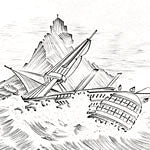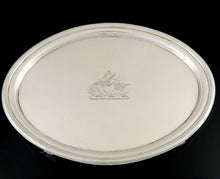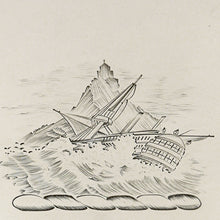24cm (9.5in) x 18cm (7in)
An oval salver with reeded edge on four scroll feet, the centre engraved with the unique armorial crest granted to England’s greatest frigate captain Sir Edward Pellew in March 1796 in recognition of his gallantry in saving the lives of hundreds men, women and children on 26 January of that year - the crest being ‘Upon waves of the sea, the wreck of the Dutton, East Indiaman, upon a rocky shore, off Plymouth garrison’. Maker’s mark of London silversmith William Bateman. Hallmarked London 1803.
Read more
This unique and stylish George III salver celebrates through its armorial an event which was one of the proudest of Pellew’s long and extraordinary life. Already knighted and celebrated as a the highly successful commander of the Plymouth based Western Frigate Squadron in the ongoing war with Revolutionary France, Pellew and his wife were on their way to dine with a local clergyman when they saw crowds converging on the seashore beneath the Citadel. Out in Deadman’s Bay, the Dutton, bound for the West Indies and with fever ravaging the troops between the decks, had foundered on the rocks and was in danger of being broken up by the unrelenting seas.
Having previously saved the lives of several of his own sailors who had fallen overboard, Pellew knew he must act and urged a boatman to join him in taking a line out to the stricken vessel. Yet the boatman refused causing Pellew to answer him by swimming out with a line through bitingly cold seas and climbing aboard via the the grounded and dismasted ship’s collapsed rigging. On board he found disorder and terror on all sides, and was obliged to knock down at least one drunken soldier before the rest submitted to his command. With sword drawn, he at last gained control from the quarterdeck, and with the arrival of boats, breeches buoys were rigged by which all but four of the 600 souls on board were saved under his oversight.
In view of this outstanding service Pellew was raised to the baronetage six weeks later by George III, to become Sir Edward Pellew, 1st Baronet of Treverey, (1757-1833). He later received the Royal Humane Society’s medal for the year marking another milestone in his career which he began when he ran away to sea at the age of fourteen and reached its apex when he was ennobled as Viscount Exmouth in 1816. Inevitably the ‘Wreck of the Dutton’ became one of the subjects executed by the Devon based artist Thomas Luny to illustrate incidents in Pellew's life (NMM BHC3298) - the last in the series being the crowning achievement of Exmouth’s career, the Bombardment of Algiers in 1816 by which a thousand Christians were delivered from enslavement.






